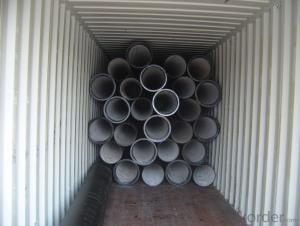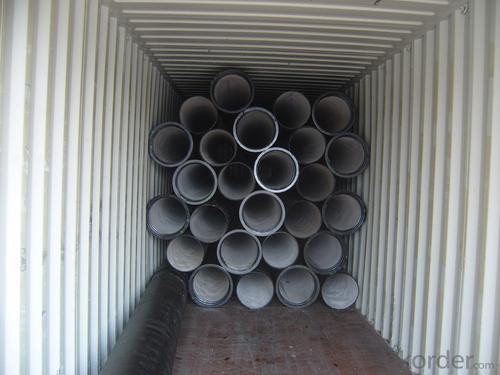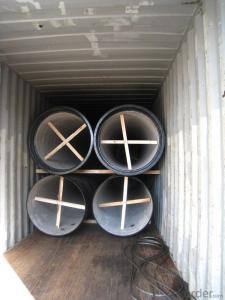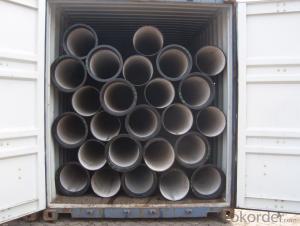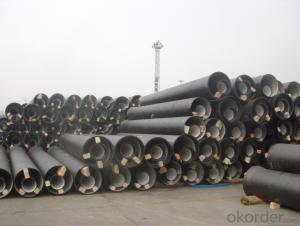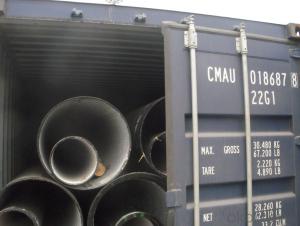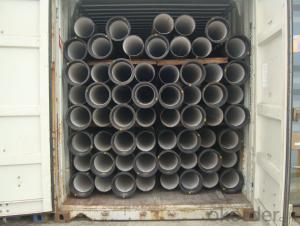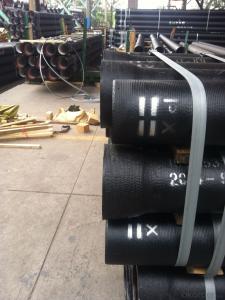DUCTILE IRON PIPES AND PIPE FITTINGS K8 CLASS DN1300
- Loading Port:
- Tianjin
- Payment Terms:
- TT OR LC
- Min Order Qty:
- 22 pc
- Supply Capability:
- 3000 pc/month
OKorder Service Pledge
OKorder Financial Service
You Might Also Like
Material : Ductile Cast Iron
Size Range : DN 80mm to DN 2000mm
Unit Effective Length : 6m or 5.7m
Manufacture Standard: ISO 2531:1998/ EN 545:2006/EN 598:2007
Annual capacity : 200,000 tons
Coating Exterior: Zinc 130g/m2 according to ISO 8179-1 and bitumen coating 70 microns.
Cement Interior: Portland Cement/ High Alumina Cement/ Sulphate Resisting Cement Lining according to ISO 4179
Special requirements on external coating and internal lining can be applied
We also provide accessories such as SBR/EPDM rubber gaskets, lubricant paste, pipe caps, PE sleeves, etc.
Additional Parts:
Each pipe is strictly inspected according to related standard to ensure permanently high performance.
Easy Installation at site and service free for life
Long Service Lifespan
Quotation will arrive you within 24hours once we get your inquiry.
We guarantee offering you a competitive price.
A copy of original inspection reports of pipes will be offered after shipment.
Photos of loading process will be sent to the customer after shipment effect.
We will follow-up the delivery progress after shipment effect and update to the customer on weekly basis.
- Q: What are ductile iron pipes?
- Ductile iron pipes are a type of iron pipe that possess high tensile strength and flexibility. They are made by treating cast iron with trace amounts of magnesium to create a material that is stronger and more resilient than traditional cast iron pipes. The addition of magnesium changes the microstructure of the iron, resulting in a matrix of graphite nodules within the iron, hence the name "ductile iron". This unique structure gives ductile iron pipes their remarkable properties, making them highly resistant to cracking and breaking even under high pressure and extreme temperature conditions. Ductile iron pipes are commonly used in water and wastewater systems, as well as in various industrial applications, due to their durability, longevity, and ability to withstand external loadings. They are also known for their ease of installation and low maintenance requirements, making them a popular choice in the construction industry.
- Q: How are ductile iron pipes connected?
- Ductile iron pipes are typically connected using various methods such as flanged joints, push-on joints, mechanical joints, or restrained joints. These connections ensure a tight and reliable seal, allowing for the efficient and safe transport of liquids or gases.
- Q: What are the common methods for leak detection in ductile iron pipes?
- Some common methods for leak detection in ductile iron pipes include visual inspection, acoustic leak detection, pressure testing, and tracer gas leak detection. Visual inspection involves physically inspecting the pipes for any visible signs of leaks, such as water stains or wet spots. Acoustic leak detection uses specialized equipment to listen for sounds of leaking water within the pipes. Pressure testing involves pressurizing the pipes to a certain level and checking for any drop in pressure, which could indicate a leak. Tracer gas leak detection involves injecting a gas, such as helium or hydrogen, into the pipes and using a gas detector to locate any escaping gas, which would indicate a leak.
- Q: How are ductile iron pipes protected against interior corrosion?
- Ductile iron pipes are protected against interior corrosion through a process known as cement mortar lining. This involves applying a layer of cement mortar to the interior surface of the pipe. The cement mortar acts as a protective barrier, preventing the corrosive elements in the water or fluid from coming into direct contact with the iron material. To apply the cement mortar lining, the interior surface of the ductile iron pipe is first prepared by removing any loose scale or debris. Then, a cement mortar mixture is prepared by combining cement, sand, and water to form a paste-like consistency. This mixture is then applied to the pipe's interior surface using a spinning machine or manually by skilled workers. Once the cement mortar lining is applied, it is left to cure for a specific period of time, typically around 24 hours. During this curing process, the cement mortar hardens and forms a dense protective layer on the pipe's interior surface. The cement mortar lining offers various benefits in protecting ductile iron pipes against corrosion. It provides a smooth and continuous surface that prevents the water or fluid from directly contacting the iron material, reducing the risk of corrosion. Additionally, the cement mortar lining also helps to reduce the friction within the pipe, improving flow efficiency. Regular inspection and maintenance of the cement mortar lining are essential to ensure its effectiveness in preventing corrosion. Over time, the lining may develop cracks or deteriorate, which can compromise its protective properties. Therefore, it is important to periodically inspect the lining and repair or replace it as needed to maintain the integrity of the ductile iron pipes and prevent interior corrosion.
- Q: DN300 what's the price of the ductile iron pipe / the weight and the price of one meter?
- Ductile iron pipe is a kind of cast iron. It is an alloy of iron, carbon and silicon.
- Q: What does "K8" mean in ductile iron pipe grades?
- K9 is GB, K10 is specially customized, K8... Strictly speaking, it is not up to standard, standard length, wall thickness and so on.. Many workshops, grades of factory products, such as K9, standard length 6.15M, K8 is 6M, wall thickness from the beginning of DN100, are thin on the point.
- Q: What are the different sizes available for ductile iron pipes?
- Ductile iron pipes, also known as DI pipes, are available in a wide range of sizes to suit various applications and requirements. The sizes of ductile iron pipes typically range from DN 80 (3 inches) to DN 2600 (104 inches) in diameter, with various wall thicknesses. For smaller diameters, such as DN 80 to DN 300, ductile iron pipes are commonly available in standard lengths of 5.5 meters or 6 meters. As the diameter increases, the standard lengths may also increase, reaching up to 7 meters or even longer for larger sizes. The commonly used sizes of ductile iron pipes include DN 80, DN 100, DN 150, DN 200, DN 250, DN 300, DN 350, DN 400, DN 450, DN 500, DN 600, DN 700, DN 800, DN 900, DN 1000, DN 1200, DN 1400, DN 1600, DN 1800, DN 2000, DN 2200, DN 2400, DN 2600, and many more. It is important to note that the availability of different sizes may vary depending on the manufacturer and the specific region or country. Additionally, custom sizes can also be manufactured to meet specific project requirements. When selecting the appropriate size of ductile iron pipes, it is crucial to consider factors such as the flow rate, pressure, and intended application to ensure optimal performance and durability. Consulting with industry professionals or referring to relevant standards and guidelines can help in determining the appropriate size for a specific project.
- Q: How are ductile iron pipes protected against external damage?
- Ductile iron pipes are protected against external damage through a combination of various protective measures. One common method used is the application of a protective coating on the external surface of the pipe. This coating acts as a barrier, preventing the direct contact of the pipe with corrosive elements in the surrounding environment. The coating can be made of materials such as epoxy, polyurethane, or zinc, which provide excellent resistance against corrosion, abrasion, and chemical attacks. Additionally, ductile iron pipes can be further protected by encasing them in a concrete or cement mortar lining. This lining provides an extra layer of protection, reducing the chances of physical damage due to external impacts or soil movement. The concrete or cement mortar lining also helps to improve the pipe's hydraulic performance by reducing friction and maintaining a smooth flow of water or other fluids. Furthermore, ductile iron pipes are often installed with proper bedding and backfilling techniques. This involves using suitable materials such as sand or gravel to support and stabilize the pipe, minimizing the risk of external damage caused by uneven ground settlement or heavy loads. Adequate compaction of the backfill material is crucial to ensure the long-term integrity and stability of the pipe. Regular inspection and maintenance are also essential for protecting ductile iron pipes against external damage. Periodic inspections can identify any signs of corrosion, coating degradation, or physical damage, allowing for timely repairs or replacement before significant issues arise. Additionally, proper cathodic protection systems can be employed to prevent corrosion by applying an electric current that counteracts the electrochemical reactions occurring on the pipe's surface. In summary, ductile iron pipes are protected against external damage through the application of protective coatings, concrete or cement mortar linings, proper bedding and backfilling techniques, and regular inspections and maintenance. These measures collectively ensure the durability, longevity, and reliable performance of ductile iron pipes in various environments and applications.
- Q: What does ductile iron pipe "ND200" mean?
- The tube is thin from the metal tube, and the outer diameter of the tube is almost the same as the inner diameter of the tube, so the average value of the outer diameter of the tube and the inner diameter of the pipe is called the diameter.
- Q: Can ductile iron pipes be used in coastal or marine environments?
- Yes, ductile iron pipes can be used in coastal or marine environments. Ductile iron is a type of cast iron that has been treated with magnesium to give it enhanced strength, ductility, and resistance to corrosion. This makes it suitable for use in environments with high levels of moisture, such as coastal or marine areas. Coastal and marine environments are known for their high levels of saltwater, which can cause corrosion in metal pipes. However, ductile iron pipes have excellent corrosion resistance due to their protective coating. This coating acts as a barrier between the pipe and the corrosive elements present in saltwater, preventing the formation of rust and extending the lifespan of the pipes. Furthermore, ductile iron pipes can withstand the high pressures and stresses associated with coastal and marine applications. They have a high tensile strength, allowing them to handle the weight of soil, rocks, and other materials that may be present in these environments. Additionally, ductile iron pipes are resistant to damage from external forces, such as waves or debris, making them a reliable choice for coastal or marine projects. In summary, ductile iron pipes are a suitable choice for coastal or marine environments due to their corrosion resistance, high tensile strength, and durability. They can reliably transport water or other fluids in these challenging environments while maintaining their structural integrity over an extended period of time.
Send your message to us
DUCTILE IRON PIPES AND PIPE FITTINGS K8 CLASS DN1300
- Loading Port:
- Tianjin
- Payment Terms:
- TT OR LC
- Min Order Qty:
- 22 pc
- Supply Capability:
- 3000 pc/month
OKorder Service Pledge
OKorder Financial Service
Similar products
Hot products
Hot Searches
Related keywords
